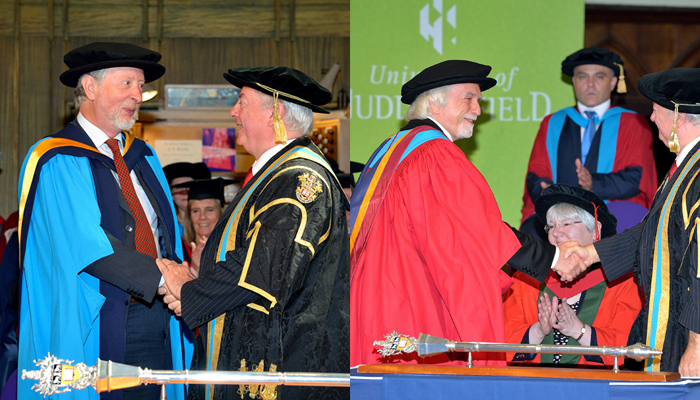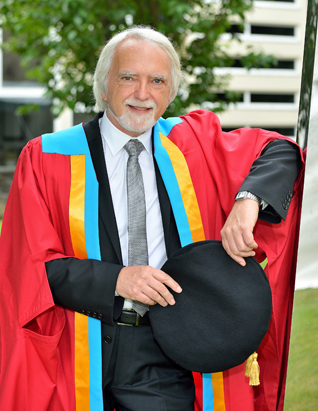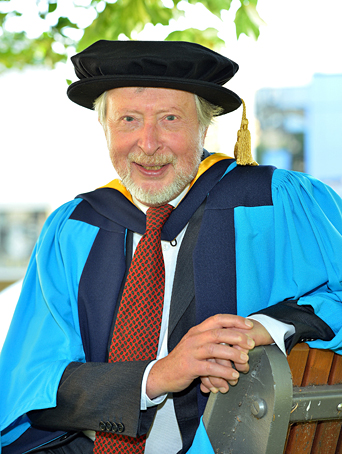Retiring professors receive Emeritus title
 Professor Richard Morris (left) and Professor Bob Cywinski (right) on the platform at the Awards Ceremonies
Professor Richard Morris (left) and Professor Bob Cywinski (right) on the platform at the Awards Ceremonies
Wed, 22 Jul 2015 12:31:00 BST
Physicist Professor Bob Cywinski and historian-archaeologist Professor Richard Morris are conferred Emeritus Professors
EMERITUS Professorships have been conferred on two leading academics who have retired from the staff of the University of Huddersfield.
They are the physicist Professor Bob Cywinski and the historian-archaeologist Professor Richard Morris. They received their honours at separate ceremonies during the University’s graduation awards week.
The title of Emeritus Professor is conferred on a member of staff who has retired and who is deemed to have served the university with particular distinction.
 Professor Robert Cywinski
Professor Robert Cywinski
Professor Cywinski – whose latest role has been Dean of the Graduate School and Special Advisor (Research) to the Vice-Chancellor – was also awarded the degree of Doctor of Science. This was just the fourth DSc awarded by the University, and the firsts for physics.
His DSc thesis is entitled Science, Facilities and Facilitating Science and reflects the three main strands of a research career that has led to over 250 papers, books, policy documents, patents and films designed to popularise science.
Professor Cywinski was born and educated in Huddersfield and gained his degrees in Manchester and Salford. He has held key appointments at UK universities that include St Andrew’s and Leeds, before his appointment at Huddersfield in 2008. His career has also included membership of the team that built the world’s most powerful neutron and muon source – ISIS, in Oxfordshire. He has also been closely involved with the project to create the European Spallation Source, now under construction in Sweden.
He has been notable for his role in increasing public engagement with science, for example by writing and producing scientific films featuring Lord Robert Winston and University of Huddersfield Emeritus Chancellor Sir Patrick Stewart. Professor Cywinski has also adopted the persona of the Quantum Cowboy for an educational television programme.
There have been many media appearances, lectures to All-Party Parliamentary Groups in the House of Lords and the Commons, public lectures across the UK – and a performance at the Glastonbury Festival.
 Professor Richard Morris
Professor Richard Morris
Professor Morris, who has also been made Emeritus Professor, is one of the most accomplished and versatile archaeologists and historians of his generation. His areas of expertise include medieval church architecture, aerial archaeology, the conservation of historic buildings and the history of aviation. In 2003, he was appointed OBE for services to archaeology.
His books and articles deal with topics that include the archaeology of battlefields, the history of monasticism and the architecture of cathedrals, alongside biographies of WWII aviators Leonard Cheshire and Guy Gibson. He is currently completing his biography of the aeronautical engineer Barnes Wallis, inventor of the bouncing bomb, and is the co-author of an account of the Dams Raid.
One of Professor Morris’s most remarkable books is Time’s Anvil (2013), a wide-ranging examination of archaeology that includes a fascinating strand of autobiography. A reviewer described it as “an impassioned history and defence of archaeology, a history of humanity in England, and a heartfelt meditation on transience and mortality”. The book was a candidate for the 2013 Samuel Johnson Prize.
Professor Morris studied English at Oxford and music at York before turning to archaeology. In 1971, he became a member of the team excavating under York Minster, moving from there to become the Churches Officer of the Council for British Archaeology (CBA). In 1988, he joined the Department of Archaeology at the University of York. In 1991, he returned to the CBA as its director, helping to launch the magazine British Archaeology. He directed the Institute for Medieval Studies at the University of Leeds before joining the University of Huddersfield in 2010.
Professor Morris is a trustee of the National Heritage Memorial Fund. Previously he served for nine years as a Commissioner of English Heritage. He has chaired the Ancient Monuments Advisory Committee for England and the Expert Panel of the Heritage Lottery Fund, and is a former trustee of the National Coal Mining Museum for England.







